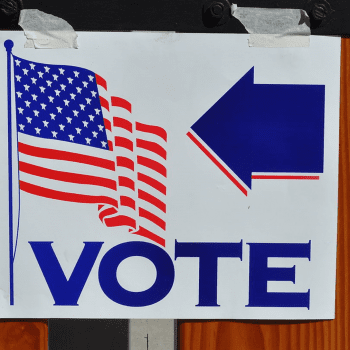The text of the Supreme Court decision is available at this link.
The two-sentence background is this: by popular referendum, Arizona established a nonpartisan redistricting commission to determine congressional districts in a gerrymander-free manner, but the state legislature didn’t like having their power usurped, so they found a loophole — the statement in the Constitution that the Legislature, not a independent commission, has the authority — and they sued. The Court, by the usual 5-4 margin, with Ginsburg writing the opinion, found in favor of the redistricting commission.
Here’s a key paragraph from the opinion (there may be others that state the matter more directly; I’m just skimming quickly):
The Arizona Legislature’s complaint alleged that “[t]he word ‘Legislature’ in the Elections Clause means [specifically and only] the representative body which makes the laws of the people,” App. 21, ¶37; so read, the Legislature urges, the Clause precludes resort to an independent commission, created by initiative, to accomplish redistricting. The AIRC responded that, for Elections Clause purposes, “the Legislature” is not confined to the elected representatives; rather, the term encompasses all legislative authority conferred by the State Constitution, including initiatives adopted by the people themselves.
Having summarized the two arguments, the majority opinion agrees with the latter, that “the Legislature” really means “any authorized legislative process.” in part because direct initiatives didn’t really exist at the time the Constitution was written, and because, in Ginsburg’s view, the Constitution-writers didn’t really mean to write “the Legislature” except as a stand-in for “by a legislative process,” but mostly because that was the desirable outcome.
I’m with Roberts; here’s the opening to his dissent:
Just over a century ago, Arizona became the second State in the Union to ratify the Seventeenth Amendment. That Amendment transferred power to choose United States Senators from “the Legislature” of each State, Art. I, §3, to “the people thereof.” The Amendment resulted from an arduous, decades-long campaign in which reformers across the country worked hard to garner approval from Congress and three-quarters of the States.
What chumps! Didn’t they realize that all they had to do was interpret the constitutional term “the Legislature” to mean the people”? The Court today performs just such a magic trick with the Elections Clause. Art. I, §4. That Clause vests congressional redistricting authority in “the Legislature” of each State. An Arizona ballot initiative transferred that authority from “the Legislature” to an “Independent Redistricting Commission.” The majority approves this deliberate constitutional evasion by doing what the proponents of the Seventeenth Amendment dared not: revising “the Legislature” to mean “the people.”
The Court’s position has no basis in the text, structure, or history of the Constitution, and it contradicts precedents from both Congress and this Court. The Constitution contains seventeen provisions referring to the “Legislature” of a State, many of which cannot possibly be read to mean “the people.” See Appendix, infra. Indeed, several provisions expressly distinguish “the Legislature” from “the People.” See Art. I, §2; Amdt. 17. This Court has accordingly defined “the Legislature” in the Elections Clause as “the representative body which ma[kes] the laws of the people.” Smiley v. Holm, 285 U. S. 355, 365 (1932) (quoting Hawke v. Smith (No. 1), 253 U. S. 221, 227 (1920); emphasis added).
The majority largely ignores this evidence, relying instead on disconnected observations about direct democracy, a contorted interpretation of an irrelevant statute, and naked appeals to public policy. Nowhere does the majority explain how a constitutional provision that vests redistricting authority in “the Legislature” permits a State to wholly exclude “the Legislature” from redistricting. Arizona’s Commission might be a noble endeavor— although it does not seem so “independent” in practice—but the “fact that a given law or procedure is efficient, convenient, and useful . . . will not save it if it is contrary to the Constitution.” INS v. Chadha, 462 U. S. 919, 944 (1983). No matter how concerned we may be about partisanship in redistricting, this Court has no power to gerrymander the Constitution. I respectfully dissent.
In the Obamacare decision, there was no explicitly constitutional issue at stake, merely the appropriate interpretation of a law. In the Obergefell case, well, we’re used to courts making it up as they go along when it comes to social policy and “rights.”
But: much as I’m a big fan of redistricting commissions and think gerrymandering is terrible, for the Supreme Court majority to literally discard the plain text of the Constitution in order to get to the desired outcome — well, it’s bad news.
In Illinois, of course, we have a similar issue: our esteemed state constitution writers included a clause that state workers are guaranteed that their accrual rates will never be decreased, even for future accruals. The legislature is trying all manner of tricks, when it’s apparent that we need an amendment.
And at the federal level, it seems just as likely that we’ve set up the Constitution as a sacred document and would rather have the Supreme Court twist its words than contemplate amendments.














